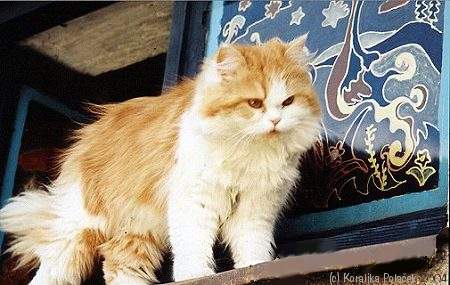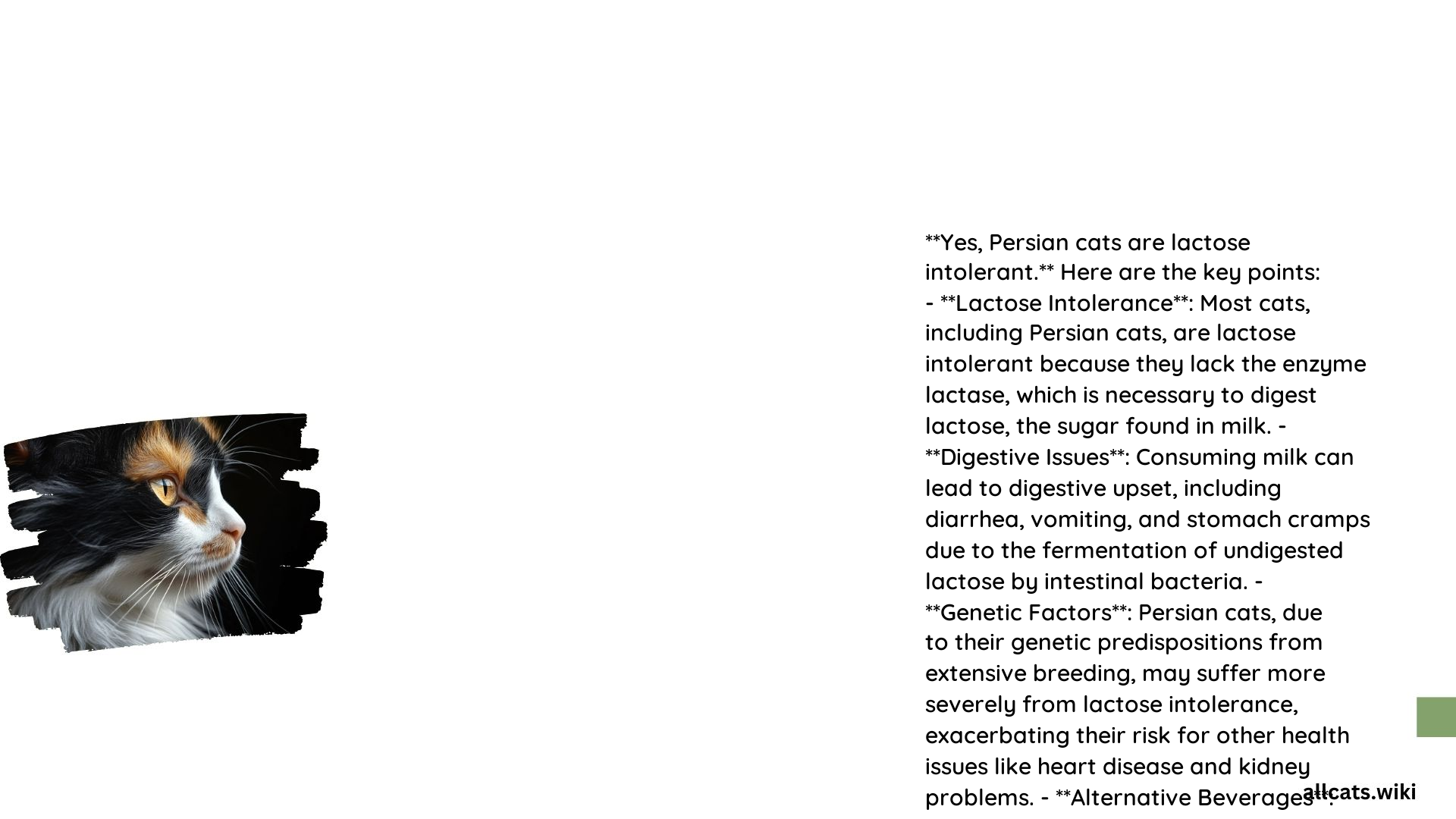Detailed Analysis: Are Persian Cats Lactose Intolerant?

Persian cats, like most adult felines, are lactose intolerant due to their inability to produce the enzyme lactase, which is necessary for the proper digestion of lactose. This article will provide a comprehensive understanding of lactose intolerance in Persian cats, including the biological mechanisms, evidence, and practical advice for their care.
What is Lactose Intolerance in Persian Cats?

Detailed Explanation of Lactose Intolerance in Persian Cats
Lactose intolerance in Persian cats, as in most adult cats, arises from the inability to digest lactose, a sugar found in milk. This is due to the lack of the enzyme lactase, which breaks down lactose into easily digestible sugars (galactose and glucose).
Biological Mechanisms:
– Lactase Enzyme: Kittens produce lactase to digest their mother’s milk. However, as they mature, the production of lactase decreases or stops entirely. Without lactase, lactose remains undigested in the intestines, where it is fermented by bacteria, leading to gastrointestinal distress.
Evidence and Studies Supporting Lactose Intolerance in Persian Cats
- General Feline Lactose Intolerance: Studies and veterinary advice consistently indicate that adult cats, including Persian cats, are lactose intolerant. This is a natural consequence of their evolutionary diet, which is high in protein and low in carbohydrates.
- Symptoms and Health Risks: Consumption of lactose-containing products can lead to symptoms such as excessive gas, abdominal pain, bloating, vomiting, diarrhea, and constipation. These symptoms are not unique to Persian cats but are common in all lactose-intolerant felines.
Can Persian Cats Drink Cow’s Milk?
Health Risks and Symptoms
- No, Persian cats should not drink cow’s milk. The lactose in cow’s milk cannot be digested by adult cats, leading to severe gastrointestinal symptoms. These include vomiting, diarrhea, bloating, and abdominal pain, which can be particularly problematic for Persian cats due to their predisposition to various health issues.
Why Are Persian Cats Lactose Intolerant?
- Genetic Factors: The genetic makeup of cats, including Persians, does not support the production of lactase enzymes in adulthood. This is a result of their evolutionary history as obligate carnivores, which means their diet naturally consists of high protein and low carbohydrate content.
- Dietary Considerations: Persian cats, like all cats, are designed to thrive on a diet rich in animal proteins and fats, with minimal carbohydrates. Their digestive system is not adapted to handle lactose or other carbohydrates found in milk.
What Should Persian Cat Owners Do?
Alternatives to Cow’s Milk
- Water: The best beverage for cats is water. Ensuring a fresh water supply is crucial for their hydration and overall health.
- Nutritional Substitutes: If you need to add moisture to their diet, consider using wet cat food or adding a small amount of water to their dry food. Avoid lactose-free milks or other dairy alternatives, as they can still cause adverse reactions.
Behavioral Observations and Adverse Reactions
- Signs of Discomfort: Cats that consume lactose-containing products may exhibit signs of discomfort, including vomiting, diarrhea, bloating, and increased thirst. These symptoms can be distressing for the cat and may lead to dehydration and other health complications.
- Monitoring Health: Owners should monitor their cat’s behavior and health closely after any exposure to lactose. If symptoms persist or worsen, it is essential to consult a veterinarian to rule out other serious health conditions.
Recommendations for Monitoring and Managing Diet
- Consult a Veterinarian: For personalized dietary advice, especially if your cat has specific health issues, consult with a veterinarian. They can recommend the best diet and nutritional plan tailored to your cat’s needs.
- Avoid Dairy Products: Completely avoid giving your cat any dairy products to prevent gastrointestinal distress and other health issues.
- Maintain a Balanced Diet: Ensure your cat’s diet is rich in animal proteins and moderate in fats, with minimal carbohydrates. This aligns with their natural dietary requirements and helps maintain their overall health and well-being.
References
- Arbor Pet Hospital: “Can Cats Drink Milk?” – This article explains why cats are lactose intolerant and the health risks associated with milk consumption.
- Wag: “Lactose Intolerance in Cats” – This resource provides detailed information on the symptoms, causes, and treatment of lactose intolerance in cats.
- Fluffy Cat Owner: “Can my Persian cat drink normal milk?” – This blog post specifically addresses lactose intolerance in Persian cats, including why they should not consume milk and the potential health risks.
